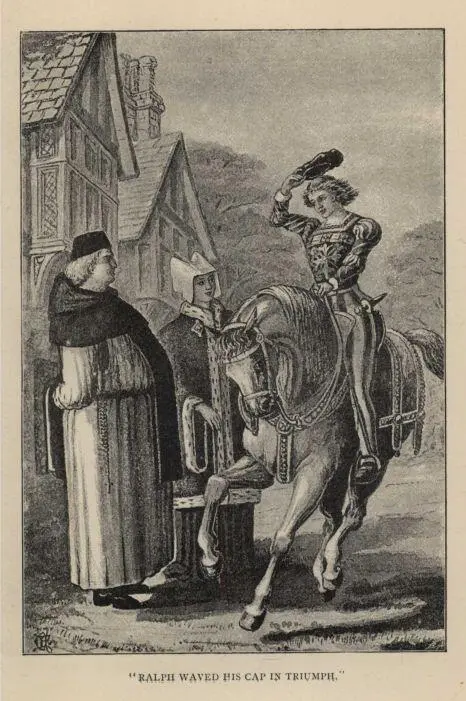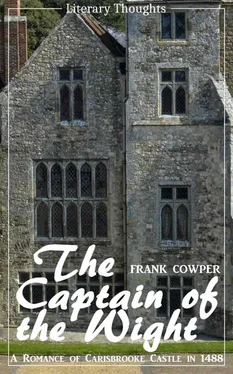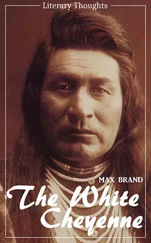"Well, young master, thou managest him well enough, and I am glad to see that thou hast profited by the lessons of thy lady mother, and hast learned courtesy and easy manners. An thou goest on thus, thou wilt bring credit on thy family, and my Lord Woodville will value thee and us right worthily. Take the horse with my benediction, and may the Lord be with thee, even as He was with David. May He make thine arm strong, and thy spear sharp against all that is vile, mean, and base in this world. Mayest thou win knighthood, and not filthy lucre, by thy prowess; though indeed, as Paul saith, 'The workman is worthy of his hire,' and they do err grievously who think that the ministrations of Holy Church should be rewarded only by thanks, and naught else."

"RALPH WAVED HIS CAP IN TRIUMPH."
During this speech, the tailor and Humphrey, with Master Jasper and his varlet, had come up, and the inferiors all doffed their caps as they listened respectfully to the Abbot.
"'Tis a learned man and a holy," said the tailor as they went round to the servants' offices, "and he draws a right subtle distinction in that same matter of the acquisition of goods; for as a rolling stone gathereth no moss, so a knight that acteth full knightly hath no means to acquire wealth for himself, whereas an Abbot, or churchman, who liveth well in one place, layeth up much goods for himself and Mother Church. Piety without wealth is as an addled egg that showeth a fair outside but is all fruitless and deceitful within. And as 'tis the duty of the Church to spend and be spent in the service of the saints, how can they spend if they have naught to give away."
While the tailor moralised thus to Humphrey, they entered the kitchen. Ralph and Jasper were walking by the side of their mother and the Abbot; they had dismounted from their horses, and had given them to the groom to take round to the stables.
After taking a few turns up and down in front of the house, Lady Lisle said she must go in and see the tailor, for no time was to be lost in cutting out and making the necessary clothes for Ralph to take with him.
It had been settled that all must be ready by to-morrow early, as the Abbot had to travel to Winchester to meet Sir Edward Woodville, who was going to stay there one night, on his way to Southampton to cross over to the Isle of Wight. There was, therefore, a great deal to be done, and Ralph was taken in by his mother to be measured and fitted, while she set her maids to work to sew the various pieces together as the tailor cut them out.
There was one part of the preparation Ralph liked very much; that was the selecting the weapons he would need as a page, and which might serve him if he should reach the rank of esquire before he returned home again. He was a tall boy and strong, therefore his father bade the old major-domo, who had acted as his esquire, select sound and strong arms, such as a good sword, a well-tempered dagger, and a stout bow with fitting arrows; while a target, a back and breast piece, and a light steel cap, with a strong under jerkin of leather, completed his defensive attire.
It was decided that Humphrey should go with him, and a sumpter horse was to take the baggage of master and man. The evening was passed in great excitement on the part of Ralph, who could not keep still for a minute, and caused Jasper to break out in wrath several times, while his father and mother watched him silently, the latter with eyes full of affectionate sadness. It was the first time the family circle had been broken up.
Suddenly Jasper remembered the poor man and his daughter, and, glad of an opportunity of directing attention to some other matter, he said,--
"Marry, Ralph, we never asked what became of that old beggar and thy nag; didst hear whether they had left him in the stables?"
"Was it a poor man and a young girl?" said Lady Lisle.
"Ay, mother; didst thou see them?"
"Certes I did, and a quandary it put me into too. For I saw it was thy pony, Ralph, and I marvelled what had come to thee. But the vagrant put me at ease. Poor old man, and poor little wench, they were sorely bested; and when I heard their tale, I felt proud of my son Ralph. 'Twas well done to succour the weary and footsore."
"Humph!" said the Abbot. "I know not, fair lady, whether 'twere altogether a wise action. The beggar was a stranger, and 'tis a mad prank to lend thy goods to people thou dost not know."
"Maybe, Lord Abbot; but I bethink me of One who not only lent but gave to those whom He did not know."
"Ay, marry, so do I, fair lady, but we who live in the world must be careful not to be visionaries or unlike other folk; and if Ralph goeth with me, he must be mindful of the saying, 'Honour to whom honour is due.' Now a beggar and his slut of a daughter are not fit people to give one's pony too--unless, indeed, he is mindful of being a saint; if so, he'd best not go to my Lord Woodville."
The evening was soon gone, and all things were in fair way for an early start to-morrow. The hospitable Lady Lisle had given a night's lodging to the two weary wayfarers, who had told her their journey lay to the Isle of Wight, where the aunt of the young girl lived; and Lady Lisle had said she would see what could be done to further them on their way--perhaps even the Abbot of Quarr would allow them to go in his train.
Before retiring to rest, Sir John Lisle called his son to him, and gave him solemn words of advice, and as Ralph listened, boy as he was, he felt proud of his father for speaking such noble words.
"My son," the old knight said, sitting in his large arm-chair, laying his hand on the boy's head, who sat at his feet on a low stool, looking up into his father's face, "my son, thou art going forth like a fledgling from the nest. Thou hast been gently nurtured, and hast proved that the good lessons of thy lady mother and Sir Thomas Merlin[*] have sunk into thy heart. But the world into which thou goest will offer many trials and sore temptations. I cannot guard thee beforehand against all; but there are some few things I can tell thee, and thy mother will tell thee some others. Fear God before all things! Fight the King's enemies, and those of thy country; and never turn thy back on the foe as long as thy chief bids thee fight. In all things be obedient, and pay reverence to those in authority over thee. Be liberal, courteous, and gentle. Let thy charges be as thy purse can pay. Thy kinsman, the Abbot of Quarr, will aid thee in all that is right for thy place in life; for I have assigned him certain lands and rents in trust for thee, and thou must maintain the rank of thy family and name. Brave I know thou art, and truthful, I well believe; but of the matters that appertain to thy gentle life, these thy lady mother will tell thee. I have been too much a man of war in these troublous times, and, I fear me, God loveth not those who have used the sword too freely. But 'tis in the blood, and we are not able to fight against it. And now, my son, may God be with thee. Fare thee well. Win thy spurs, and come home a very gentle, perfect knight."
[*] Priests were in that age called "Sir."
So saying, the old knight laid his hands on the boy's wavy hair, and let them rest there a little space, while his lips moved, as if in prayer. When he removed his hands, he raised the boy and kissed him on his forehead, and bid him "Good-night."
Ralph was touched, and went up to his room, for the first time that day sorry he was going; but soon the glorious life before him caused him to forget tender thoughts, and he got into bed longing for the night to be over and his adventures to begin. While he was lying wide awake, unable to sleep through excitement, he heard his mother's step outside the door, and in another minute she came in.
Читать дальше













